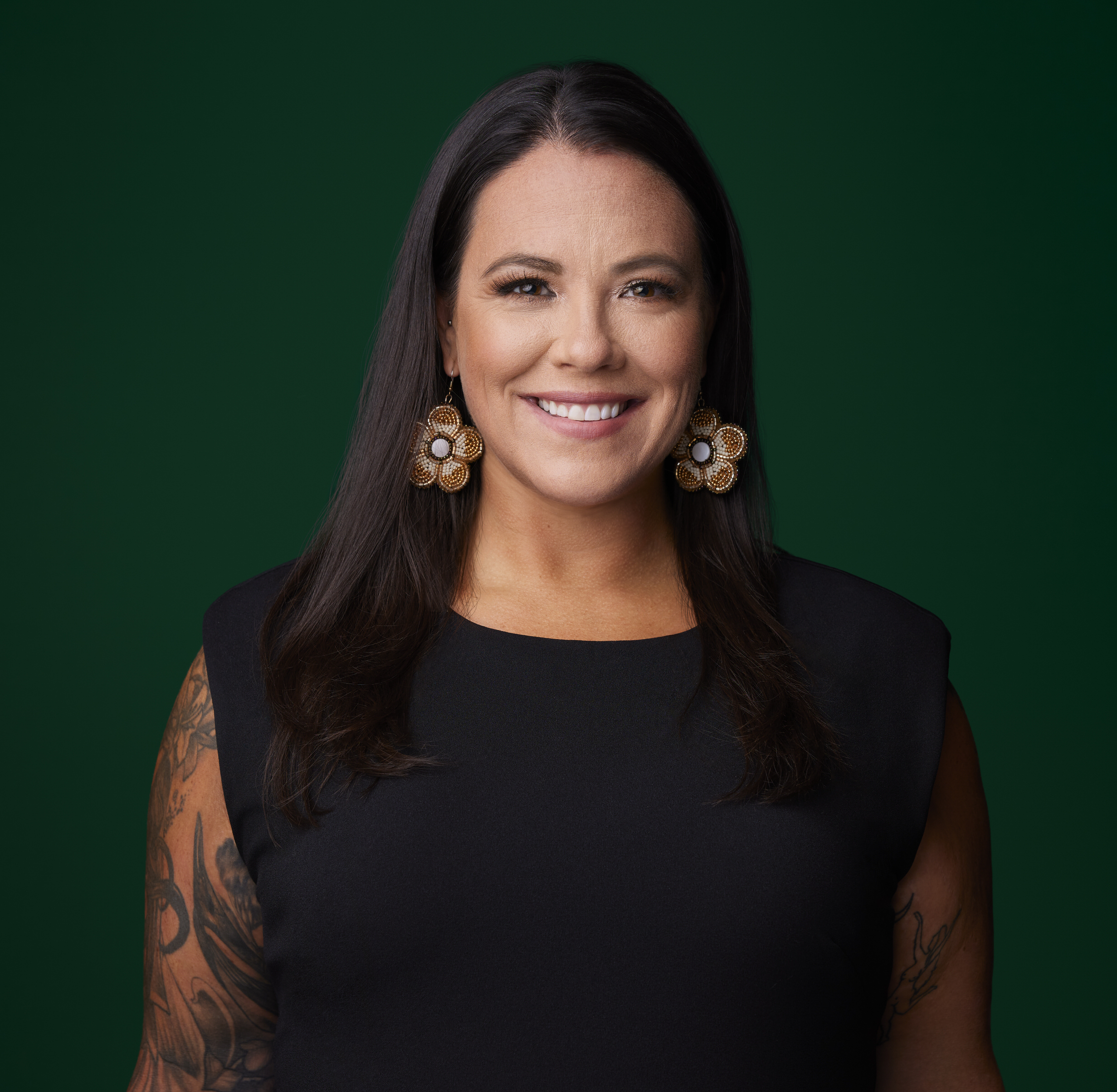2023 Alumni Honour Award: Reagan Bartel
Gillian Rutherford - 22 September 2023

Reagan Mary Bartel, ’04 BScN, ’19 MPH, ’19 GradCert (ComDiseases); (photo credit: Ryan Parker)
When the COVID-19 restrictions hit, Reagan Bartel knew she needed to do something to keep people connected.
“Isolation hit everyone hard, but for Alberta Métis, our community is so tight-knit, gatherings are wellness for us,” says Bartel, who is director of health for the Métis Nation of Alberta.
“To know that those things were going away for an unknown period of time during COVID? I asked myself, ‘How do you shift to find creative and innovative ways to maintain those connections?’” she recalls.
With Bartel leading, the Nation pivoted and moved cultural activities, health education and mental health supports for its 56,000 members online. She held online community meetings to answer questions. When vaccines were finally available, Bartel and her team had 10 days from conception to delivery to roll out the first Métis-led vaccination clinics in the country.
The clinics, which were open to Métis, First Nations and Inuit alike, were held in Edmonton, Lac LaBiche, Fort McMurray and Calgary. Guests were greeted by Métis people and included cultural components such as traditional fiddle music and food — all ways to make the experience less intimidating. Ultimately 80 per cent of Métis Nation of Alberta members received at least two doses.
“Unfortunately, our health system is racist in Canada,” Bartel says. “And during COVID I wanted our department and my Nation to be a safe space for our citizens.”
One of the pandemic legacies she is most proud of is a new mental health program that allows members up to 12 hours of psychological counselling at no cost. There’s a community wellness advocate in place to help members with more specialized needs. Community-based dental health clinics providing episodic care are up and running and now expanding in partnership with Access for All Dentistry, a U of A student-led initiative. Research and program development projects are underway with various U of A health faculties. Land-based programming is just getting started. And Bartel’s next goal is to establish a primary care clinic that is run for Métis people by Métis people.
Like so many, Bartel decided to become a nurse because she wanted to help people.
“I know that sounds incredibly cliché, but anytime in the hospital with my own family or with friends, the nurses were always the ones that were visible and making my family feel better. They were the doers,” she recalls.
“They were compassionate, critical thinking, easy-to-get-hold-of human beings supporting people through the worst moments and the best moments of their lives. I just thought to myself, ‘What a career.’”
Bartel started out as a candy striper as a teenager in Kimberly, B.C., and then worked as a nursing attendant and auxiliary care worker while completing her nursing degree in amiskwacîwâskahikan (ᐊᒥᐢᑿᒌᐚᐢᑲᐦᐃᑲᐣ), known by most as Edmonton. She joined the float pool at the Royal Alexandra Hospital, then found her home on the intensive care unit for 16 years.
“I loved having the autonomy in critical care, being able to flex that ‘nurse brain’ and being the primary caregiver for someone who is so sick,” she says.
Bartel even took critical care shifts during COVID-19 as a way to offer her former colleagues “fresh legs and fresh eyes and, sadly, a fresh heart after all they had seen during the pandemic.”
She was uncommonly well prepared for the challenges the pandemic would present, because in 2018 she left her hospital role to take a master’s degree in public health, as well as a graduate certificate in communicable diseases.
Going back to school was just a natural evolution of her nursing career, Bartel says.
“As a bedside nurse, I saw the challenges that folks faced when their social determinants of health were not optimized, where socioeconomic status, intergenerational trauma, all of those issues, were contributing to poor health,” she says.
“I decided to look upstream, where I could take the critical thinking and problem-solving and analytical skills that I have as a nurse and apply them to wicked problems from a different lens.”
When she received her Métis sash at her convocation, a Knowledge Keeper told her, “Go out and do good things for our people.”
So she took the job as director of health for the Métis Nation of Alberta in 2019. And then COVID hit.
As a leader, Bartel makes a point to listen more than she speaks. She says she continues to approach her role the same way she did when she was a critical care nurse — a leadership style that catches some by surprise.
“It’s quite comical to folks who are not nurses, because that’s not a leadership style that you’d necessarily see outside of nursing — one where you welcome everybody’s feedback without any sort of hubris,” Bartel explains.
“It’s the recognition that, yes, I might be the primary person responsible, but my brain is not the only brain that exists. I ask, ‘What am I missing? How can I pull in somebody else’s knowledge?’ I poll the room, and that is a very nursing-centric way of being, where the team matters as much as the single individual who is leading that team.”
She encourages young people to consider nursing as a profession and hopes that hospital nurses who may be feeling stuck or burnt out will see her experience as a sign they can take their skills into other roles, rather than quitting the profession altogether.
She never wanted to be pigeon-holed and her career path has shown that.
“You don’t stop being a nurse just because you’re away from the bedside,” she says. “Once a nurse, always a nurse.”
Two other U of A nursing grads have been honoured with a 2023 Alumni Award: Mona Lisa Bourque Bearskin, ’95 BScN, ’07 MN, ’14 PhD, and Hannah O’Rourke, ’08 BScN(Hons), ’15 PhD. Find out more about the Oct. 25 award ceremony and other recipients.